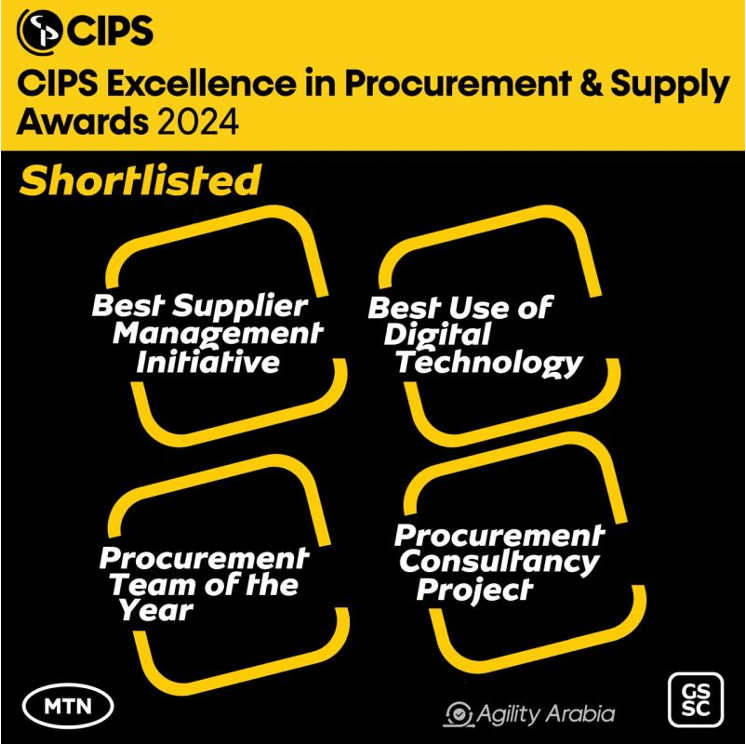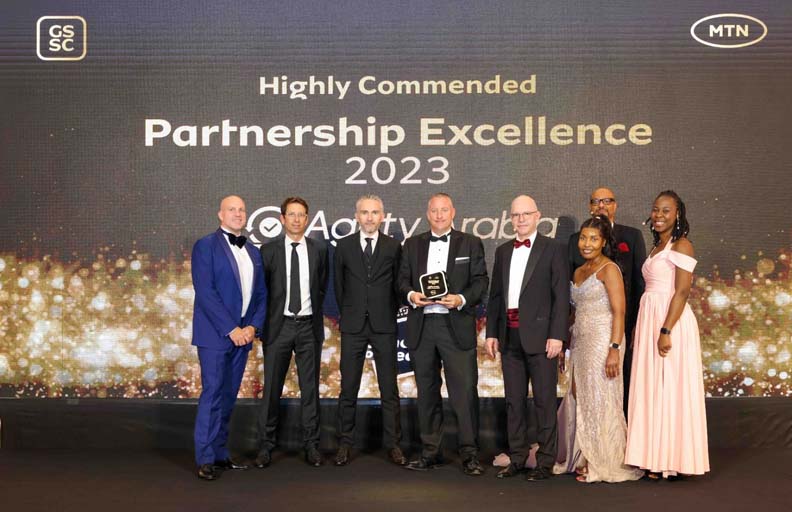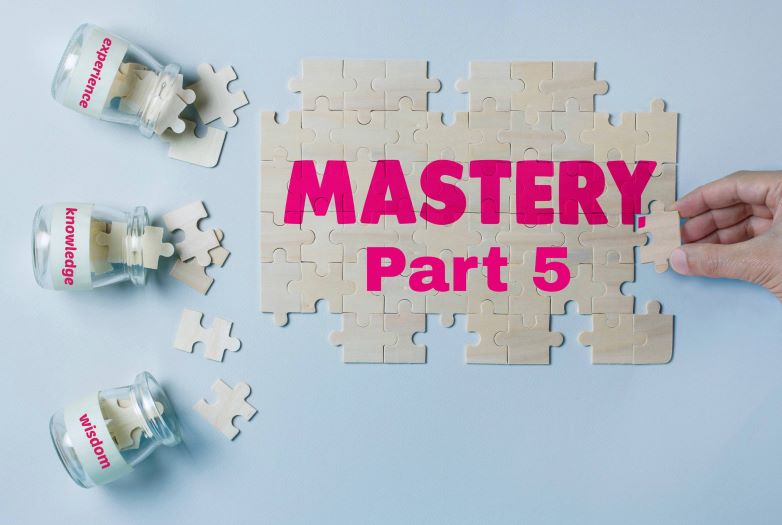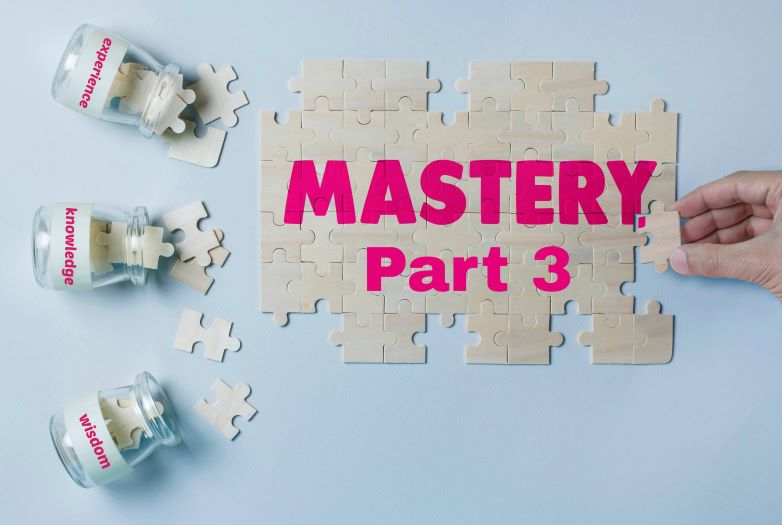MTN's Agile Transformation Journey: Redefining Procurement in the Digital Age New
About MTN
MTN Group is Africa’s largest mobile network operator, providing voice, data, fintech, digital, enterprise, wholesale and API services to more than 291 million customers in 16 markets across the African continent. MTN’s purpose is to enable the benefits of modern connected life to everyone.
Global Sourcing and Supply Chain (GSSC) leads global procurement, supplier management and supply chain for the MTN Group
Speaking about the success of the initiative, Andrew Savage (Global Lead Procurement Excellence) said:
"Agility Arabia's team played a pivotal role in setting up and aligning all teams with the prescribed methodologies and guidelines. Their responsibility extended to coaching, guiding, and mentoring each team member, fostering active participation from over 80% of our organisation in agile initiatives. we saw an improvement of up to 55% in strategic RFP cycle times, illustrated the tangible benefits of the transformation. Within three months, our agile Net Promoter Score (NPS) doubled, reflecting the success of our collaboration."
Download the full MTN Case Study here
About the Project
MTN set out to undertake a complete enterprise Agile transformation across its entire organisation. The goal was to transition from a traditional “waterfall” linear sourcing process to an iterative Agile sourcing approach, significantly reducing sourcing throughput time.
Agile, with its roots deeply embedded in software development, might seem like an unconventional choice fora procurement department. However, GSSC recognised its potential. They understood the transformative power of Agile to drive profound improvements in operational and process effectiveness. Focused sprints enabled faster deliverables and a high level of adaptability to change.
Agility Arabia was selected as the service provider to partner with GSSC on this journey. They were chosen not only for their regional expertise but also for their prestigious Scrum.org accreditation as a member of the Partner Training Network, and as a pioneer in Agile procurement practices. Together, they collaborated to craft an outcome-based contract structure that delivered mutual benefits and aligned remuneration.
Starting in Dubai with their Procurement department, MTN’s goals were to:
Increase speed
Increase responsiveness:implement a robust procurement service that could accommodate high levels of change
❖ Increase responsiveness: implement a robust procurement service that could accommodate high levels of change
❖ Enhance speed to market and speed to source products: With a presence across multiple countries, MTN’s regional Operating Companies (OpCos)have diverse and time-sensitive requirements. Historically, OpCos had identified GSSC as a process-heavy bottleneck that hindered their ability to adapt to and address their unique, ever-changing market needs
❖ Enable rapid delivery: Reduce time to market to capitalise quickly on emerging consumer trends
Decrease Costs
❖ Process standardisation: Every organisation seeks efficiency. For GSSC, this meant standardising procurement processes where feasible, eliminating duplication and inefficiency, and promoting cross-team collaboration
❖ Reduce waste: Eliminating bottlenecks and delays, thereby reducing project timelines and cost to deliver
Increase quality
❖ Transparency and transformation into a value creation function:GSSC aimed to champion transparency and, more importantly, transition into a value creation function. This involved implementing a framework that provided a clear view of the project roadmap and live initiatives, coupled with constant feedback loops. This, in turn, would enable them to adapt swiftly to market fluctuations.
❖ People talent upgrade: MTN sought to upgrade its entire Procurement and Supply Chain teams to future-fit their skill sets. This included capabilities in digital, data science, and Agile framework operating methodology.
The Transformation Timeline
Q1 2023:
❖ A robust organisational restructure was undertaken, aligning domain areas around dedicated squads
❖ Transformation programme success metrics were identified and tracked
❖ Roles were revisited and remapped to align with LAP accountabilities
❖ Cross-functional teams were created to cover the five core areas of GSSC operations
❖ Key LAP practices were trained and coached across the entire GSSC department to ensure alignment. This included:
➢ Critical success factors while introducing agile in procurement / sales / partner management
➢ Use of Agile Artifacts and ScrumEvents
➢ Team empowerment
➢ Cross functional team ofBusiness/Delivery, Procurement, IT and all main support functions needed
➢ Use of Proto-Personas
➢ Identification of customer needs, backlog creations, weighting and prioritisation
➢ Relative estimation
➢ Continuous peer feedback
➢ Working agreements
❖ An extensive, strategic, and prioritised roadmap was created between the OpCos and GSSC.
❖ Maturity matrices and scoring by AgilityArabia, based on a proprietary 23-point assessment, were rolled out. This framework measured each team’s performance level against key Agile criteria, such as:
➢ Structure and quality of Scrum events (Daily Scrum, Sprint Planning, etc.)
➢ Fulfilment of the key Agile accountabilities
➢ Alignment with LAP Framework components
➢ Behavioural measures related to teamwork, including willingness and ability to work cross-functionally, and the team’s approach to handling blockers.
❖ The first teams began using LAP principles in their day-to-day work.
❖ By quarter-end, eight teams were operational.
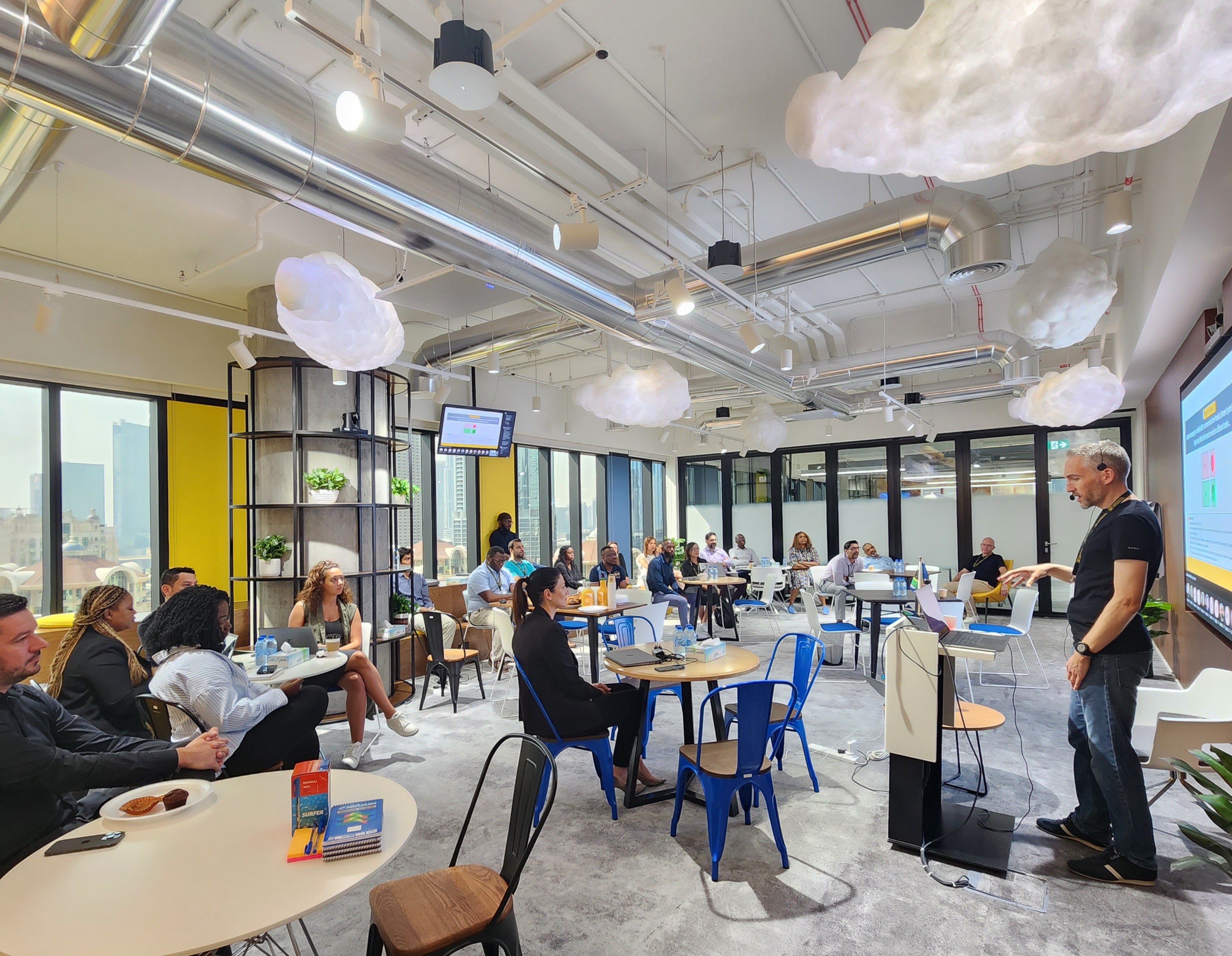
Q2 2023:
❖ Regular training sessions continued for new joiners to maintain knowledge levels.
❖ Refresher training sessions implemented for previously certified team members to ensure knowledge retention.
❖ Weekly informal “Breakfast & Learn” knowledge-sharing sessions were held across the department.
❖ Consistent tooling and training were implemented.
❖ Progress check-ins with senior management ensured the transformation program remained aligned to strategic goals.
❖ By quarter-end, 13 teams were operational, representing 84% of the entire department.
❖ The commitment to continuous learning became evident, and Q3 focused on levelling up the entire department through Agility Arabia’s coaching support.
Transformation Outcomes
Over six months, MTN’s Procurement department saw the following outcomes:
❖ Operational excellence: large strategic RFPs reduced in timeline by 55% or more, saving MTN hundreds of thousands of dollars annually.
❖ AgilityArabia’s coaching impact: a substantial majority (75%+)strongly believed that the hands-on, on-site coaching and training helped them do their roles more effectively
❖ Team engagement: 84% of GSSC were actively participating in Agile projects.
❖ Positive employee feedback: Anonymous employee surveys reported that:
➢ NPS scores for the LAP framework went from negative sentiment, to +12 and to +23.
➢ 80%of the department reported high confidence levels in using and understanding the LAP framework.
➢ 74%felt that the LAP framework was helping them to do their jobs better.
❖ AgileMaturity: The independent maturity scoring framework indicated a clear, unbiased view of team progression. All 13 teams progressed from low maturity levels that required regular coaching to being highly mature and self-managing Agile teams.
❖ Transparency, trust and collaboration are now central to how GSSC engages with the wider organisation, adding significant value to the whole procurement process.
❖ Shorter feedback loops across the value chain are now paramount to faster decision-making and reduced time to market for procurement initiatives. Empowered, cross-functional teams are critical to achieving this, reducing decision latency and increasing team engagement
Main Challenges
MTN faced a number of challenges throughout its Agile transformation journey.
❖ A completely new initiative: This was an industry-first undertaking, where methodologies traditionally used in software development were to be reimagined and transformed into a strategic sourcing process.
❖ Process development and scale: Developing the process itself was highly challenging, particularly given the complexity of running multi-billion-dollar, large-scale strategic sourcing projects. Ensuring adoption of the process at scale proved equally difficult.
❖ Change resistance: A common challenge in Agile transformations, this was effectively mitigated at MTN through consistent training and internal communications that clearly articulated the transformation’s value to team members and the organisation. The on-site presence of Agility Arabia’s coaches further supported this effort.
❖ Framework consistency: Initially, the department struggled to maintain consistent adherence to Scrum and LAP. This was promptly resolved through continuous support from Agility Arabia’s on-site coaches.
❖ Organisational buy-in: Success required commitment not only from individual teams but also from broader organisational stakeholders. These stakeholders needed to understand the framework and its value. Agility Arabia and GSSC collaborated closely to upskill them.
❖ Cross-timezone collaboration: The geographically distributed nature of the teams presented collaboration challenges. These were addressed through the use of consistent digital tools, strict framework adherence, and team working agreements that clarified expectations for navigating timezone and cultural differences.
❖ Context switching: Juggling multiple priorities—traditionally managed reactively—was overcome by having teams align around single, prioritised product backlogs, each with a single accountable Product Owner. This approach brought transparency and clarity across the organisation.
❖ Implementation timing: To balance business-as-usual operations with the adoption of Agile practices, a phased implementation approach was favoured over a "big bang" rollout. This led to temporary inconsistency in ways of working across teams.The challenge was managed through a carefully executed implementation plan, delivered within a short timeframe with strong support from both Agility Arabia coaches and GSSC leadership.
Next Steps
❖ MTN and GSSC’s Agile transformation stands as a shining example of how traditional departments can innovate and enhance their processes. This journey demonstrates that—with clear objectives, expert guidance, and an unwavering commitment to change—Agile frameworks can drive significant improvements, even in non-software environments. Through this transformation, GSSC has set a benchmark for other MTN departments to follow.
❖ At the time of writing, the transformation is ongoing, building on the successes and lessons of previous quarters. The focus going forward will be on:
➢ Further enterprise-wide rollout of Agile across the MTN business
➢ Appointment of an enterprise Agile Coach to oversee a team of country-level Agile Coaches
➢ Further training of the Scrum Master cohort to advanced Agile/LAP certification
Agility Arabia and MTN were shortlisted for this project in 2024 Excellence in Procurement and Supply consultancy project of the year, MTN were also shortlisted for 3 additional awards.
